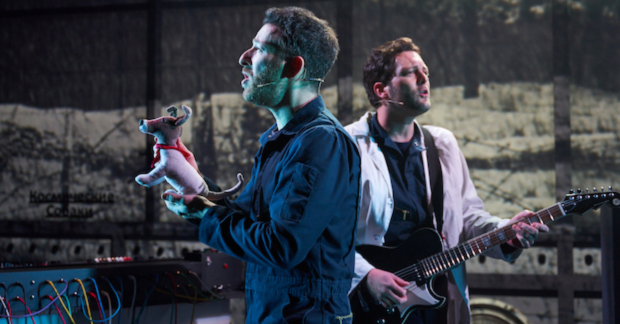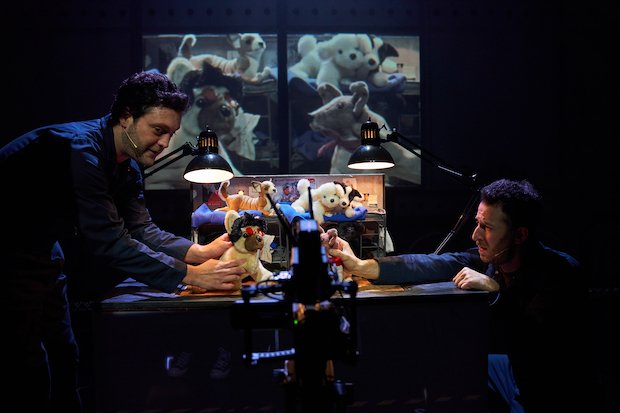Review: Space Dogs Turns the Story of Laika Into a Two-Person Musical, With Puppets
Nick Blaemire and Van Hughes’s historical musical makes its premiere at MCC Theater.

(© Daniel J. Vasquez)
In the spirit of a show that makes a niche NPR joke in introducing one of its songs, one way to characterize the new musical Space Dogs is as the theatrical equivalent of the popular NPR science podcast Radiolab. It's the kind of show that feels a need to jazz up a potentially dry subject with an excess of flashy technique and cutesy antics. Some might find Nick Blaemire and Van Hughes's new historical show charming for that reason. I found it overbearing from the start, when the two creators/performers come onto the stage and immediately start tossing toy puppies at the audience. Based on the amused audience laughter I heard throughout the performance I attended, though, your mileage will undoubtedly vary.
What isn't in doubt is the inherent fascination of its subject matter. Space Dogs is, on one level, about Laika, the famous Russian dog who became the first animal to orbit the earth in 1957. But the musical is also a broader recounting of Cold War tensions as manifested in the space race that developed between the United States and the Soviet Union during the 1950s. And on a more metatheatrical level, Space Dogs is a testament to Blaemire and Hughes's filled-to-bursting enthusiasm for the subject, expressed via a two-performer musical with pleasant songs that range from satiric to mournful.

(© Daniel J. Vasquez)
That enthusiasm is reflected not only in the two stars' sheer energy level throughout the show's 90 minutes, but in the ceaselessly inventive stagecraft on display in director Ellie Heyman's production. Production designer Wilson Chin has surrounded Blaemire and Hughes with large subwoofers set up arena-style, with some of those speakers set up backward, offering a surface for Stefania Bulbarella and Alex Basco Koch's colorful projections. Some of those projections include imaginative use of onstage cameras and green screen to put Blaemire and Hughes in Soviet newscasts and other such older settings. Mary Ellen Stebbins's fluid lighting gives the show an appropriately otherworldly atmosphere throughout. The most noteworthy aspect of Heyman's production, however, is Amanda Villalobos's puppet and props design, with Laika and other dogs represented by puppets operated by the two stars, and box fans used as miniature versions of centrifuges, among other inspired bits of stage business.
It's the puppetry, however, that also illustrates the line that Space Dogs walks between agreeably quirky and insufferably twee. For Blaemire and Hughes, it's not enough to just have puppets play some of the dogs that were involved in the early days of the Soviet space program. They also anthropomorphize them, giving them dialogue and personalities — including one hard-boiled dog seen smoking a cigarette — in the manner of a kids' afterschool special, save one or two off-color lines of dialogue to make it seem more "adult." This conceit may be a symptom of their apparently worshipful reverence toward dogs, as evidenced by the number "A Brief History of Dogs," with their frequent refrain "dogs are our saviors," punctuated by myriad projections of various breeds.

(© Daniel J. Vasquez)
Without this move toward humanizing dogs, however — including having this show's version of Laika worry about whether he could "be of service to my country or a man," as he sings in the song "Getting Me High" — Space Dogs wouldn't have much of a narrative or emotional through-line, especially once Laika's own terminal fate is revealed towards the end. But history itself rarely follows neat narrative and emotional threads in the first place. A musical like Space Dogs that feels obligated to impose one on history can't help but feel simplistic, especially when combined with an approach to the retelling of that history that comes off as overly simpering.
Some of Blaemire and Hughes's songs suggest the smarter musical Space Dogs could have been. "Blessed by Two Great Oceans," for instance, alternates between folksy and warlike in ways that cleverly capture a sense of darker forces lurking underneath the picture-postcard surfaces of American life in the 1950s. And to their credit, the creators don't shy away from acknowledging the moral compromises the US made in trying to outdo the Russians in the space race, including bringing Nazi scientist Wernher von Braun on board to aid in their efforts to launch a man into space. Even such moments that evince an actual political and moral perspective on history, however, are overwhelmed by Blaemire and Hughes's insistent desire to entertain at all costs. This well-intentioned musical ends up feeling like something they most likely didn't intend: an insult to audience intelligence.









